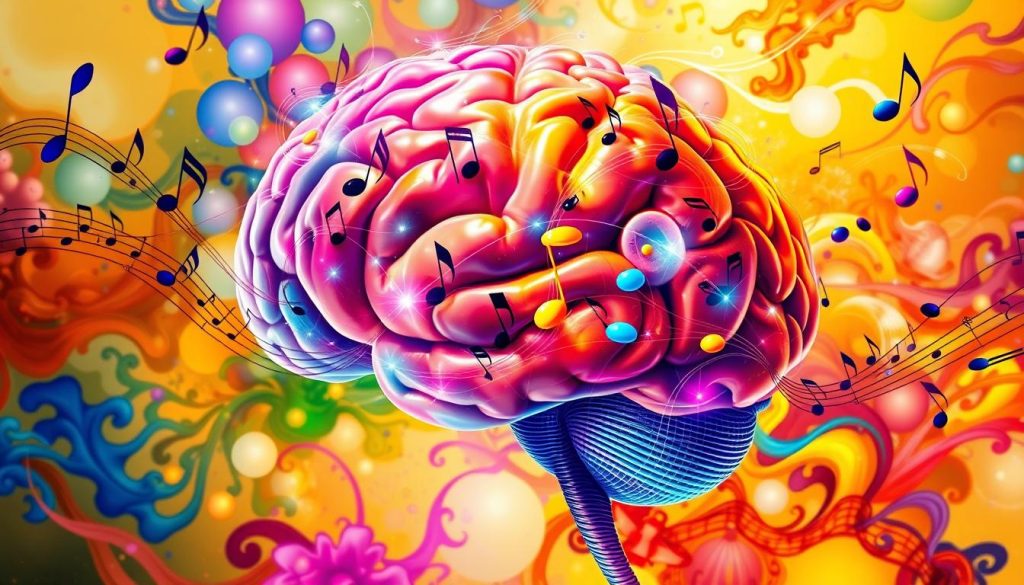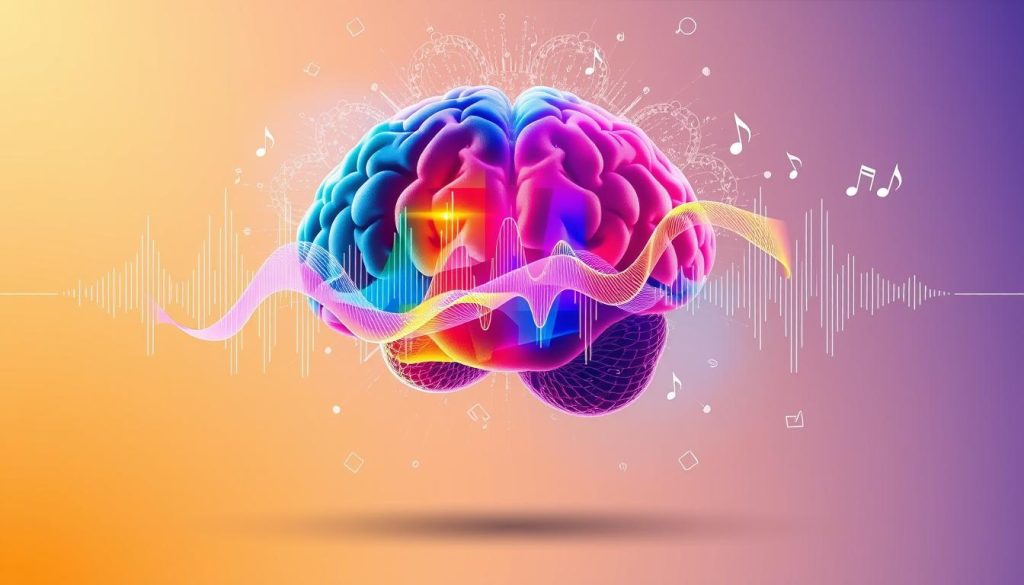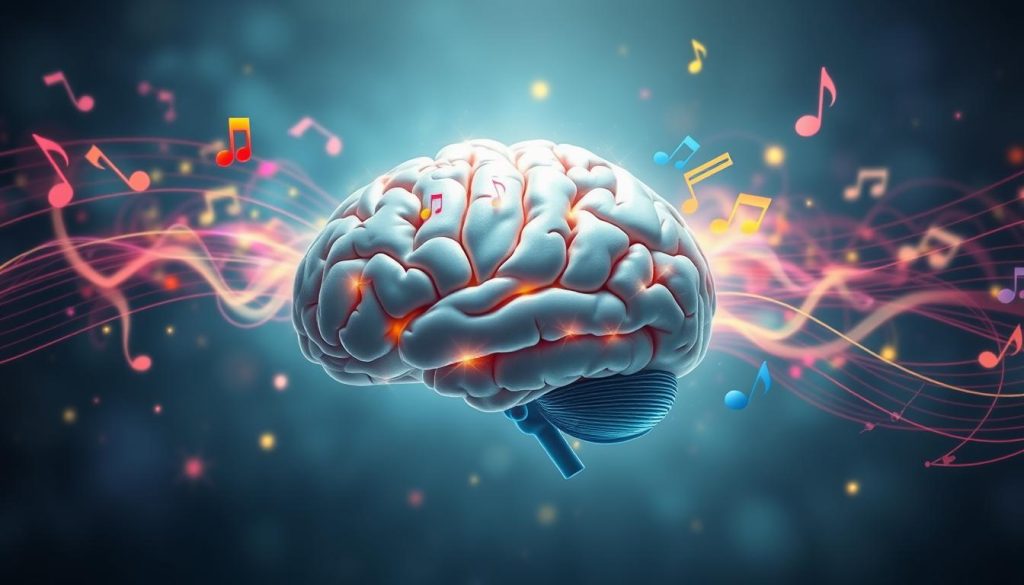Ever wondered why some music makes you feel calm or focused during meditation? The science behind it is amazing. It shows how sound waves affect your brain, leading to big mental benefits.
When you meditate with music, it’s more than just listening. It’s a way to change your mind state through sound. Learn how meditation tunes can improve your meditation experience.
Quick Recommendation: Our blog explores the science behind sound and how music affects the brain during meditation. If you're looking for a way to effectively enhance your meditation practice, we recommend the InnaPeace program.
The Neuroscience of Sound and Music
Exploring the link between music and the brain takes us into cognitive neuroscience. Our brains are always changing and creating new neural networks thanks to brain plasticity. Listening to music or sounds changes these pathways, leading to new brain structures and functions.

Cognitive neuroscience shows us how we perceive sound. Sound waves become neural signals that our brain understands. This lets us enjoy music’s depth and richness. It also boosts learning, memory, and emotions.
Studies also show music’s impact on brain plasticity. Playing an instrument or listening to music often activates brain areas. This helps our brains grow and change, improving skills like attention and language.
How Music Influences Brain Waves During Meditation
Music deeply affects brainwaves, especially when you’re meditating. It can sync your brain’s rhythms through brainwave entrainment. This helps you relax, reaching states of deep meditation.

Alpha waves are linked to calm and focus. Soothing music can make your brain align with these waves. This makes it easy to enter a meditative state.
Theta waves are for deep meditation and creativity. Different musical tracks can help your brain reach these states. This shows how music can guide you into deeper meditation.
Music’s rhythmic patterns help your brain follow along. This makes meditation more effective. By using music, you can enhance your meditation practice.
Benefits of Music in Meditation Practices
Adding music to your meditation can greatly benefit your mental and physical health. One key advantage is stress relief. Soothing sounds during meditation create a calm space. This makes it easier to relax and release daily worries.
Music also boosts enhanced mindfulness. Listening to rhythms and melodies helps you stay in the moment. This focus improves your meditation, leading to deeper relaxation and clearer thinking.

Another great benefit is better concentration. Music’s rhythmic patterns keep your thoughts steady. This helps you focus on your breath or mantras. Improved concentration also helps with daily tasks.
Studies show that music in meditation offers many benefits. Experts say it increases well-being and happiness. It’s a valuable tool for mindfulness.
Understanding music’s role in meditation can help you achieve better mental and emotional balance. Whether you’re new or experienced, music can unlock many health benefits.
The Role of Different Types of Music
Exploring music in meditation shows each genre has its own effects. Classical music creates a calm atmosphere, helping you relax and focus. Its soothing melodies and rhythms are great for quieting the mind during meditation.

Binaural beats can change your brain’s frequency. They help you relax, get creative, or concentrate. By listening, you can align your body’s rhythm and brain waves, improving your meditation.
Nature sounds, like rain or ocean waves, also work well. They bring the outdoors into your meditation, helping you feel connected to nature. These sounds can ground you and make meditation more immersive.
Choosing the right music for meditation is crucial. Whether it’s classical, binaural beats, or nature sounds, each offers unique benefits. The right music can help you achieve your meditation goals, whether it’s relaxation, energy, or focus.
Music and the Brain: Scientific Studies and Findings
Neuroscientific research has uncovered the deep connection between music and our minds. Scientists use advanced imaging to see how sounds affect our brains. This shows how melodies and rhythms shape our thoughts, making music therapy a key mental health tool.
Studies show music boosts our brain power. It helps with memory, focus, and managing feelings. This proves music’s value in improving our minds and helping us heal.

Music therapy is also shown to help in clinics. Patients feel better, less stressed, and more mentally stable. This evidence supports music therapy as a safe, effective way to tackle mental and emotional issues.
Research also shows music can target specific brain areas. This opens up new ways to improve brain function and health. As more research comes in, it’s clear music is a powerful tool for mental strength and brain growth.
Creating Your Personal Meditation Soundtrack
Creating a personal meditation soundtrack is a rewarding journey. Start by thinking about what sounds you like. Do you find peace in the sound of an acoustic guitar or the soft waves of a sound bath? Choose what feels right to you.
Consider what you want from your meditation. Do you want to relax, focus better, or heal emotionally? Pick music that matches your goals. Look for sounds that evoke the feelings you want to experience.
It’s also good to mix different sounds. Try combining nature sounds with music or vocal harmonies with ambient noises. This creates a rich, immersive experience that meets your preferences.
Your meditation soundtrack should reflect your unique self. By carefully choosing and blending sounds, your playlists can greatly improve your meditation. This allows sound healing to work its magic, elevating your meditation practice.
Quick Recommendation: Our blog explores the science behind sound and how music affects the brain during meditation. If you're looking for a way to effectively enhance your meditation practice, we recommend the InnaPeace program.
The Connection Between Sound, Memory, and Emotion
Exploring how sound, memory, and emotion connect shows us music’s power. It can bring back memories and emotions with just a few notes. Whether it’s a favorite song or a classical piece, music has a special way of reaching us.
This connection between music and emotions is real, backed by science. The brain’s sound processing areas are linked to emotion and memory. This is why a song can make us smile or cry.
Music also plays a big role in how we feel. By choosing the right music for meditation, we can reduce stress and improve focus. Whether it’s nature sounds, instrumental music, or pop songs, the right tunes can change our mood.
Adding music to meditation makes it even better. It enhances the experience and boosts emotional and cognitive benefits. As we listen, we can find deeper relaxation and awareness. It connects sound, memory, and emotion in a powerful way.
Conclusion
Exploring how music affects your brain during meditation has revealed a lot. It shows how music can change your brain waves and improve your mindfulness. Studies also highlight its role in reducing stress and promoting calmness.
Trying out different music can make your meditation more personal. By choosing sounds that resonate with you, you can enhance your mindfulness. Whether it’s classical, ambient, or nature sounds, each can impact your mood and well-being.
Remember, sound is a powerful tool for self-care. It can change how your brain works, leading to a more balanced mind. Your unique path in using music for meditation can greatly improve your mental health. It can help you live a more peaceful and centered life.
Quick Recommendation: Our blog explores the science behind sound and how music affects the brain during meditation. If you're looking for a way to effectively enhance your meditation practice, we recommend the InnaPeace program.

